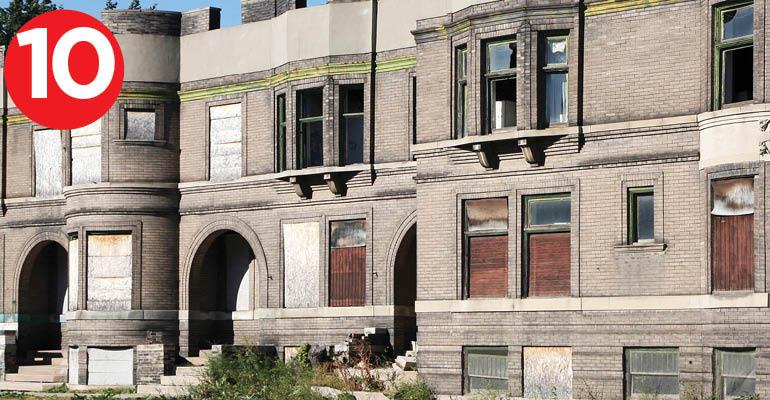- Second Act for Shuttered Mills Revitalizes New England Towns “In many parts of New England, repurposed mills and factories are bolstering long-struggling communities. The buildings, though often in disrepair, have high ceilings, large windows and solid floors, which make them attractive for a variety of uses. Owners can also capitalize on prime locations, often in the center of town and on rivers that once helped power the machinery inside the factories.” (The New York Times)
- Pot Companies Shed Real Estate Amid Dearth of Financing Options “Capital-hungry pot companies are increasingly selling off their real estate as other sources of financing dry up. With cannabis stocks down nearly 60% since their highs in March, producers that previously relied on issuing shares to raise money have been left with few alternatives, particularly in the U.S. where the drug remains federally illegal. Sale-leaseback transactions have stepped in to fill the void, becoming a key financial lifeline for an industry that needs capital to fund expansion.” (Bloomberg)
- Lawmakers Increase Criticism of ‘Opportunity Zone’ Tax Break “Lawmakers are voicing mounting concerns about a federal tax incentive, known as an ‘opportunity zone,’ that is supposed to encourage investors to pump money into the nation’s poorest neighborhoods. Leading Democrats in the House and Senate have sent a flurry of letters demanding answers and action by federal agencies after recent New York Times articles detailed how wealthy investors and real estate developers, including those with ties to the Trump administration, are poised to profit on the initiative.” (The New York Times)
- Apple, Google and Facebook Committed $4.5 Billion for Housing. Now Comes the Hard Part “As Apple built the Bay Area’s most valuable building, its new $3.6 billion headquarters that opened in 2017, the housing shortage intensified. The tech giant stayed largely out of it, paying $5.85 million to help fund only 19 affordable housing units in its hometown of Cupertino. It was neutral as a battle raged over the last few years about redeveloping its neighbor, the defunct Vallco Mall, into housing and offices.” (San Francisco Chronicle)
- WeWork Still on Life Support, Rivals Say It Must Cut Costs Fast “SoftBank may be rescuing WeWork with a $9.5 billion cash injection but most rivals say they believe the office space sharing company is still in critical condition. They say for Manhattan-based WeWork to survive it will need to slash costs and balance sheet risk, and it will need to do that fast without scaring off customers. In interviews, six rivals were mostly more sober than gleeful about WeWork’s fall to earth, which has seen estimates of its valuation drop from $47 billion or more in August to as little as $5.9 billion based on terms of the SoftBank lifeline.” (Reuters)
- Investors Put Out Welcome Mat for Hospitality Real Estate “Once little noticed, the hospitality real estate segment has been growing in prominence during the past decade, becoming one of the highest performing property plays. That’s according to data provider Preqin and investment firm Pro-invest Group. Returns for the hospitality real estate sector have met or outpaced the MSCI US REIT index over one-, three-, and five-year horizons, the Preqin-Pro-invest report indicated. The report said that fund managers have put this capital to use by deploying more than $110 billion into hospitality assets since the beginning of 2015.” (Chief Investment Officer)
- S&P 500’s Real Estate Sector Marks Worst Day in 3 Months “The S&P 500's real-estate sector Tuesday notched its worst day in three months, as investors sold shares considered defensive, including utilities and bought banks and energy names. The decline in real estate, down 1.7%, and utilities XLU, +0.20%, down 1%, representing the worst declines among the S&P 500 index's SP’s 11 sectors on the session, contributing to the broad-market benchmark's first loss in the past three sessions.” (MarketWatch)
- Airbnb Suffers Setback in Jersey City as Residents Vote to Regulate Short-Term Rentals “Despite a multi-million dollar persuasion campaign by Airbnb, Jersey City residents voted Tuesday overwhelmingly to impose greater regulation on short-term rentals in a move that is expected to hurt Airbnb’s presence in the city. The measure passed with more than 69% of the vote, according to the latest results.” (CNBC)
- JLL Revenue Skyrockets After HFF Merger “JLL saw a major revenue boost during the third quarter following its megamerger with HFF. Revenue at the global brokerage increased by 13 percent to $4.5 billion, and fee revenue increased by 14 percent to $1.8 billion, according to the company. The firm’s leasing and capital markets divisions fueled most of the growth. ‘We are very happy to see that the first combined quarter went better, frankly, than we expected,’ CEO Christian Ulbrich said on JLL’s third quarter earnings call Tuesday morning.” (The Real Deal)
- CVS to Close 22 Drugstores Next Year “CVS Health will close 22 ‘underperforming’ drugstores early next year in addition to the 46 stores it shuttered earlier this year, the company said Wednesday in a regulatory filing. The locations weren’t disclosed. The company recorded a $96 million impairment charge on its third-quarter earnings related to the 22 stores. It recorded a $135 million charge in the first quarter due to the 46 stores it closed during the second quarter.” (CNBC)
0 comments
Hide comments

